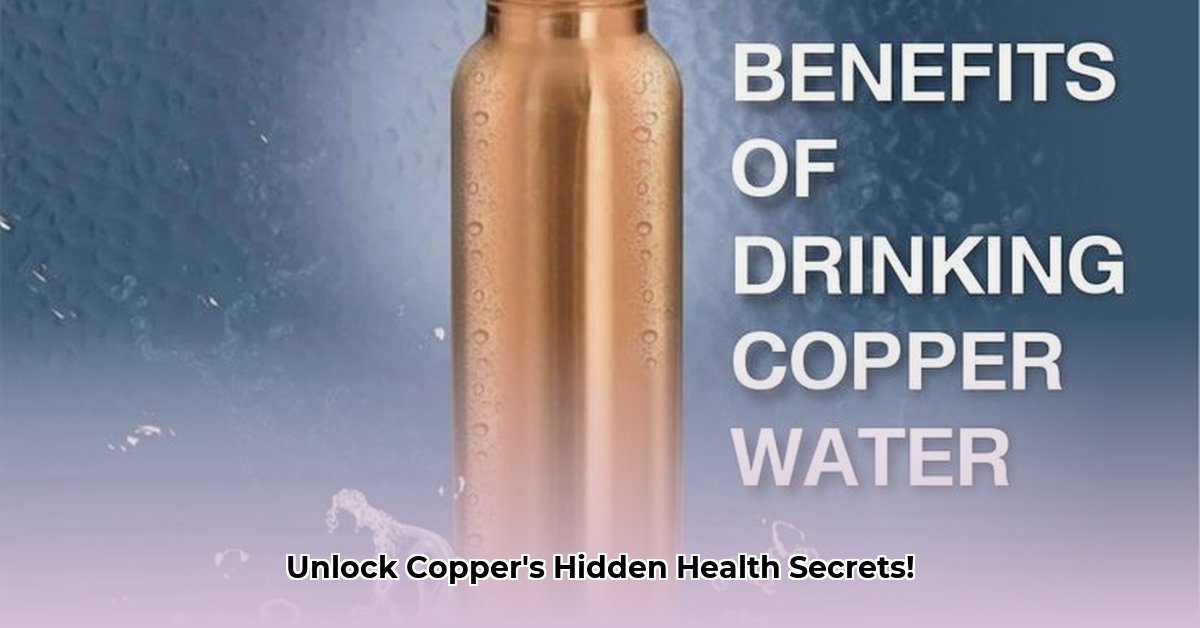
Benefits of Copper Water Bottles: Unveiling the Facts
For centuries, cultures worldwide have used copper vessels for water storage, a practice enjoying a resurgence in popularity. Many tout the health benefits of copper water, but is this ancient wisdom backed by modern science? Let's explore the evidence-based advantages and address the need for cautious usage.
What the Science Says About Copper Water
The strongest scientific evidence supports copper's antimicrobial properties. Studies demonstrate copper's effectiveness in eliminating certain harmful bacteria and microorganisms in water. This antimicrobial action stems from copper's interference with microbial function, rendering them inactive. However, this isn't instantaneous disinfection; sufficient contact time between water and copper is crucial.
While many associate additional health benefits with copper water, robust scientific evidence remains limited for most of these claims. While copper is an essential trace mineral involved in energy production and immune function, simply drinking water from a copper bottle doesn't guarantee these broader health improvements. Further research is needed to validate these purported benefits.
How to Use Copper Water Bottles Safely: A Step-by-Step Guide
To maximize the potential benefits of copper water bottles while ensuring safety, follow these guidelines:
Choosing the Right Bottle: Select a high-quality copper bottle made from pure copper, avoiding those with coatings or linings which may leach chemicals into the water.
Water Source is Paramount: Always use clean, safe drinking water. A copper bottle will not purify contaminated water; it may exacerbate the problem by reacting with existing contaminants.
Moderation in Consumption: Experts recommend limiting daily intake to 2-3 cups. Excessive copper consumption can lead to health issues.
Recognizing Signs of Copper Toxicity: Be aware of symptoms like nausea, vomiting, stomach upset, or diarrhea. Discontinue use and consult a doctor if these symptoms occur.
Cleaning and Maintenance: Clean your bottle regularly with mild soap and water. Avoid abrasive cleaners which can damage the surface and potentially introduce contaminants.
Potential Downsides and Cautions
While offering antimicrobial benefits, copper water bottles present potential risks. Excessive copper intake can lead to toxicity, causing various health problems. Using a copper bottle with impure water won't improve its quality; it may worsen the situation. Prioritize using a clean and safe water source.
Copper in Your Diet: A Holistic Approach
Remember, copper is an essential nutrient obtained through a balanced diet. Relying solely on a copper water bottle may not provide the full spectrum of necessary nutrients. A healthy, balanced diet remains the cornerstone of overall wellbeing.
Disclaimer: This information is for educational purposes only and does not constitute medical advice. Consult a healthcare professional for personalized guidance.
How to Safely Consume Copper-Infused Water Without Copper Toxicity
Key Takeaways:
- Copper is an essential trace mineral, but excessive intake is harmful.
- Copper water bottles offer proven antimicrobial benefits.
- Further research is needed to confirm other reported health advantages.
- Safe copper water consumption requires careful usage practices.
Understanding the Science Behind Copper Water
The recent surge in popularity of copper water bottles has rekindled interest in an ancient practice. While copper is a vital trace mineral contributing to various bodily functions (iron absorption, immune support), excessive consumption can lead to copper toxicity. The key lies in mindful usage.
The antimicrobial properties of copper are well-documented. Studies indicate its effectiveness against harmful bacteria, potentially keeping your water fresher. However, extensive research is needed to confirm other claimed health benefits.
Safe Consumption of Copper-Infused Water: A Practical Guide
Safe usage hinges on several vital steps:
Source High-Quality Copper: Choose pure copper bottles from reputable sources. Avoid alloys, and thicker copper is generally better.
Prioritize Water Purity: Use clean, filtered water as the starting point.
Limit Storage Time: Don't exceed eight hours of storage to minimize copper leaching.
Monitor Daily Intake: Be mindful of your copper intake to avoid toxicity. Balance with other dietary copper sources.
Recognize Toxicity Symptoms: Be vigilant for nausea, vomiting, or diarrhea. Seek medical attention if these occur.
Maintain Regular Cleaning: Clean regularly with mild soap and water; avoid abrasive materials.
Addressing Common Concerns
Questions arise about acidic beverages; storing acidic drinks increases copper leaching. The amount of copper released depends on factors like temperature and water mineral content. Long-term effects require further investigation.